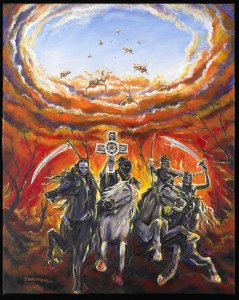My father had a minor stroke Sunday while Erin and I were off exploring the home of Mark Twain. The two seemingly unrelated events have me thinking strange things.
Mood music:
http://youtu.be/RFsOwnZkIm8
I’ve always wondered if there’s a curse over my family, given our tendency to embrace our destructive impulses and pay the consequences.
At the end of the day, I know it’s not a curse. We choose to behave a certain way and we pay the price. I paid for years of compulsive binge eating by swelling to the upper 200s on the scale and puking up stomach acid in my sleep before I started treating it like the addiction it is with a 12-Step program.
In my father’s case, he apparently spent the weekend pushing himself too hard physically. With a bad leg, bad back and high blood pressure, he should know better. With heart trouble, diabetes and a history of hardened arteries in the Brenner family history, he SHOULD be afraid to eat the wrong things. But he does it anyway.
Much of that behavior was passed down to my brain, where it mixed with OCD, depression and other nasty byproducts. I do therapy and go to 12-Step meetings.
That’s not my father’s style and never will be. I think in his mind, he’s going to do what he’s going to do and when God calls his number, so be it. In that regard, he reminds me a lot of my maternal grandfather. Papa defiantly smoked his cigars until the end, and I don’t think he would have had it any other way.
Lucky me. A fatalistic tradition coming at me from both sides of the family tree.
The thing is, while fate handles people like us accordingly, others get off scot-free. Going through Mark Twain’s house Sunday brings that to mind now.

I identify with Twain on several levels. The obvious one is the writing. Another thing is the dark humor. Another thing we have in common, which I got a better picture of Sunday, is that he, like me today, was madly devoted to his wife and children, and that he had a habit of pissing his wife off anyway with his cussing and avoiding phone calls from people he didn’t want to talk to. According to one story, his wife took him down a few pegs for paying a visit to their next-door neighbor, “Uncle Tom’s Cabin” author Harriet Beecher Stowe, without wearing the proper attire.

One other, important thing I identified with: Twain reveled in his bad habits. He smoked 20-40 cigars a day and loved to have a drink or five. Everywhere in his house is evidence of his constant smoking: the smoking table next to his chair in the library, the cigars and pipes strewn about in the study-billiards room where he wrote such masterpieces as “The Adventures of Huckleberry Finn” and “The Prince and the Pauper.”
It all made me want to smoke a big, fat cigar. I enjoy the occasional smoke, though nothing remotely close to how Twain did it.
Twain was a lot like my father. He was going to do what he did, and that was that.
I mentioned to Erin how funny it is that some folks, like Twain, can do what he did without consequence and live a long life (Twain died at 74), while someone like me has to pack it in and change my ways earlier in life. Then there’s my father, who is nearly 66 and has gotten that far despite his habits. Papa died a few months shy of his 71st birthday. Since 70 seems to be the new 40, that doesn’t seem like much longevity in this day and age.
Of course, medical treatments back then weren’t what they are today either, so whatever.
“You’re an addict,” Erin said. “Was Twain an addict?”
“Not sure,” I said.
“Either way, it’s still destructive behavior that affects you and everyone around you,” she said.
That was true in Twain’s case. Learning to live with a guy like that couldn’t have been easy for his wife.
Learning to live with a guy like me certainly hasn’t been all fun and games for Erin.
And living with my father probably hasn’t been without bumps for my step-mom.
History has it that Winston Churchill smoked cigars nonstop and was perpetually buzzed on every kind of alcohol there is. He lived to be 90.
I know from the history books that he was no fun to live with.
I can’t speak for my father, but for me one of the challenges is to remember to be me and not try to do self-destructive things because some of my heroes did them.
I tried hard to be my brother after he died. It didn’t work.
I tried hard to be Jim Morrison at one point because I thought he was cool. That didn’t work, either.
And sometimes, when I’m doing something that’s bad for me, I feel like Mark Twain, Winston Churchill and other big guys from history would approve.
There’s just one problem: I’m not them.
I try to be like my father in many ways because he’s a great man. But in other ways, I need to break the self-destructive cycle we seem to embrace.





